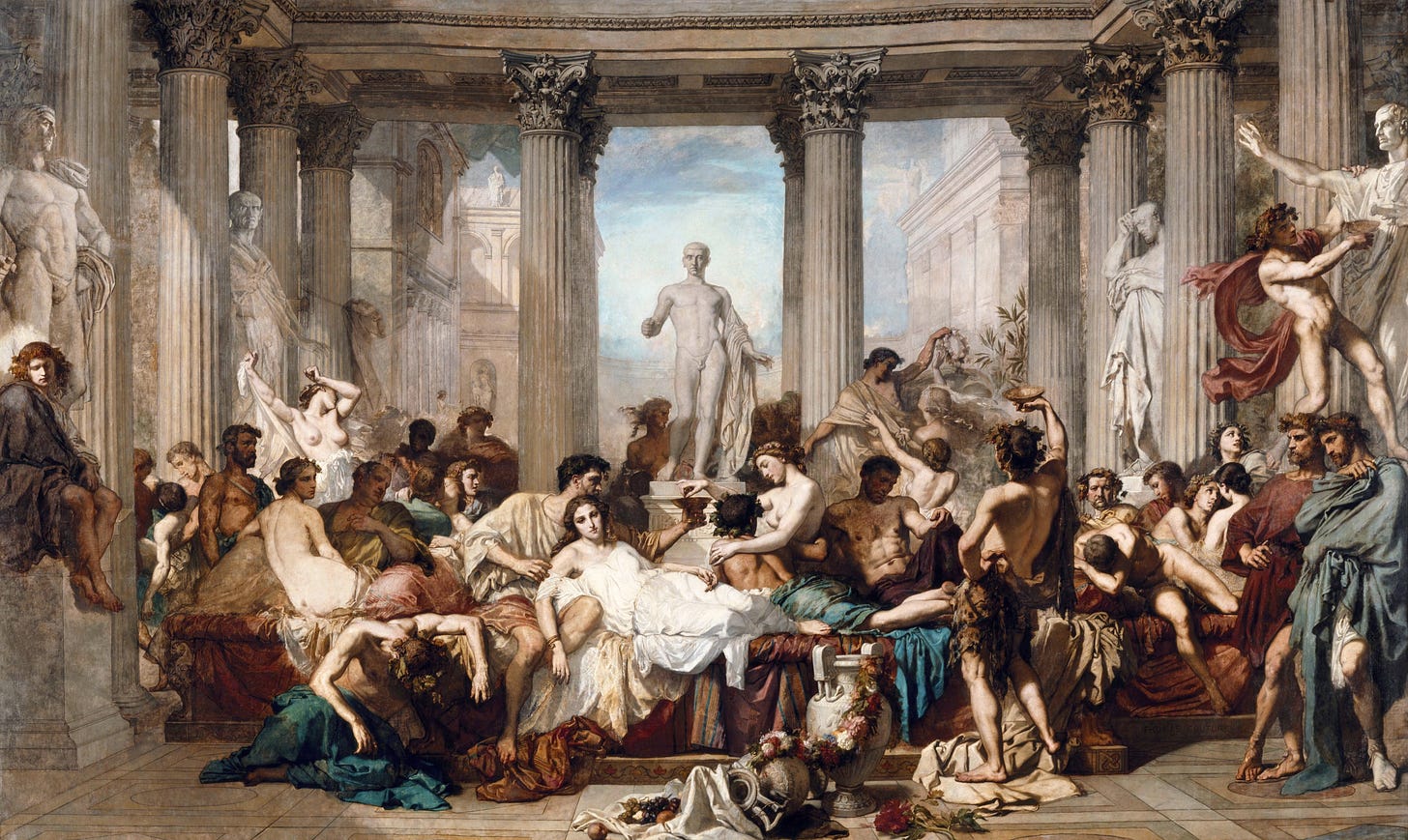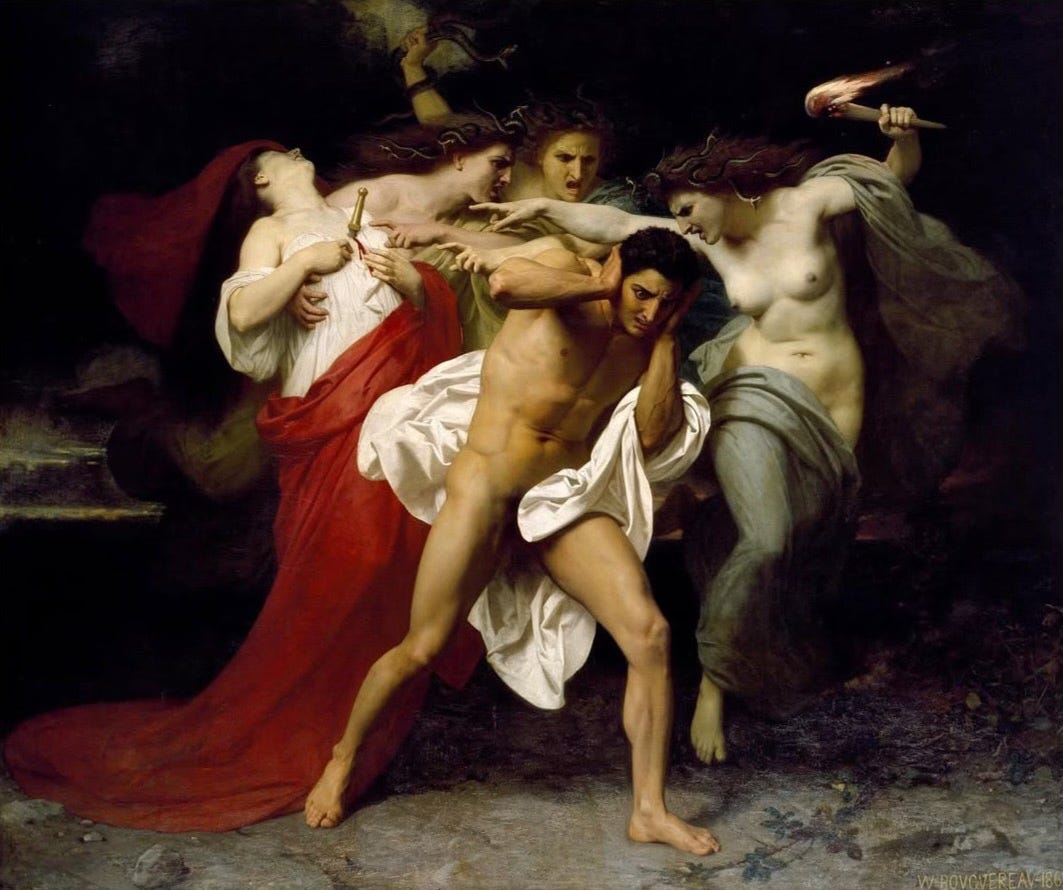From one view, the highest good is material well-being. That one should not be hungry, exposed to elements, nor deprived of a doctor when sick; and that Happiness is equivalent to the number of things you have. Herein, one’s purpose is to live. To live well. But universally, we find this insufficient.
When we obtain things, we complain that our lives lack meaning. And that amorphous concept—meaning—never holds still, prompting a type of surrender. No longer do we speak of “humanity’s purpose.” We leave that to each individual.
Subjectivism is an escape-hatch. The many-held isms that we’ve cycled over time have rendered us all exhausted. Is it material excess? Or pleasure? The kingdom of God? Or a high-rise in Manhattan? The most popular answer today is love, but nothing, in actuality, makes us more miserable. The question of human purpose has been left to each individual, but we’ve all been floundering since.
One of the simplest iterations of it, of humanity’s ultimate purpose, is ancient. Very ancient. It precedes and subverts all of our expectations. In it, Happiness is not safety, not pleasure, not love, nor anything else that we moderns exalt.
Everything has a Telos; an ultimate end. An in-built purpose, determined by nature. The ultimate end of a seed is to become an oak; of a cub, to become a tiger; of a knife, to cut—so on and so forth. Telos is not bestowed by God, decree, by man or by states but rather, it results of a thing’s form—of matter and function together. And so the seed whose inner properties must grow upward and green by necessity; the cub that must become a tiger and not an ox; and the knife whose handle and edge are meant to cut, not hold soup—all have their ends determined by nature.
Aristotle, across thousands of pages, demonstrates that we aren’t exempt. We too are creations of nature, whose matter and function point to a purpose. But we are unlike the plant—whose primary act is to absorb light and water; and we are unlike the animal—who although blessed with the gift of perception and motion, is still very much like the plant.
Clearly being alive is something we have in common with plants, but we are looking for something distinctively human, so we should set aside the life of nourishment and growth. Next would be the life of perception, but this too appears common to horse and ox and every animal. What’s left is a life that employs our thinking part.
— Nicomachean Ethics, 1.7
Embedded in us, by nature, is the capacity for rational thought. Aristotle goes so far as to say that the human soul is defined by this rational part, and that it is absent in all else. Because of it, we are liberated. We are liberated from the passive existence of the non-moving plant. But we are also liberated from the life of base instinct; of animals, who cannot resist their urge to eat or procreate. We are more.
This goes a long way in explaining his scorn for those who act like plants and animals still—who despite their rational souls, forsake it and behave like the lower.
The human body, with its capacity to act; and the mind, with its capacity to think—exist to achieve Eudaimonia. The scholars render this “Happiness,” a catastrophic decision.
Happiness, for the many, is pleasure. Not only is it the absence of pain, it is the positive experience of pleasure. It is the contentment that follows gorging one’s self, having sex or lounging. It is the cessation of work or some difficult act, replaced by play or leisure. And it is most of all the aforementioned made into a lifestyle. All our desperate striving—our labor, shouting, fighting, weeping, chasing of partners and the like—is for this. This so-called “Happiness.”
But Aristotle says:
The many and crudest seem to suppose [...] that the good and happiness are pleasure. And thus they cherish the life of enjoyment [... But] in choosing a life of fatted cattle, the many appear altogether slavish[.]
— Nicomachean Ethics, 1.5
No scholar can examine Aristotle without having to confront his teleology. And Aristotle makes explicit that his ethics are tied to nature and function. The telos of humanity is distinct from that of plants and animals because we can Reason. To say that our Telos is Happiness, is to say that our Rational Minds exist to pursue a state that is slave-like; one in which our urges and desires lord over us. This is incoherent, even if we ignore the above quote.
Our telos—our ultimate end—cannot be the same as animals, because they lack our rational minds. It is that simple. We are categorically different, and cannot have the same purpose. Aristotle is not being pejorative when he likens this type to a fattened cattle. He is being exact. Any human that lacks or neglects their Rationality is a moral and practical failure. How then, could Eudaimonia be our modern notion of Happiness?
Instead of conceding this point, philosophers and translators perform a skillful pivot. If Happiness as Pleasure is a problem, we can argue that what makes us truly Happy is being morally good. After all, most of Aristotle’s virtues are agreeable: Temperance, Generosity, Magnificence, Truthfulness, Friendliness, Justice, etc. In fact, this is precisely the solution put forth by early Christian thinkers. The problem is that the premise is patently untrue. The morally good—in the Christian sense—have actually tended to be miserable. Their lot has been persecution, execution, impoverishment, enslavement, torture, and the like.
Christians have tried to escape this dilemma by locating Happiness in the otherworld. They assert, furthermore, that good conduct while living secures it. But this fails on two fronts. First, Aristotle is explicit that a dead body cannot be Eudaimon. And secondly, he is infamous for not ascribing to any theories of afterlife. Eudaimonia, whether we describe it as Happiness or not, is a thing to be obtained while living.
Now those of a rationalist and enlightenment bent take a slightly different position. They agree that Eudaimonia is Happiness, and that it likewise results of moral goodness. But this is because the virtues have value in themselves. They are rejecting Divine Command and the reward system implied by our conceptions of heaven and hell. But this still has a normative “ought to” in it. The argument is that one “ought” to be happy if they are morally good, even if it causes pain and suffering. To their credit, when they realize that this is nonsensical, they begin to argue that the human telos is not Happiness, but Virtue in and of itself.
This solution is elegant, has been frequent, but Aristotle rejected it.
[...] it seems possible for someone to possess virtue even while asleep or while being inactive throughout life and, in addition to these, while suffering badly and undergoing the greatest misfortunes. But no one would deem happy somebody living in this way, unless he were defending a thesis.
— Nicomachean Ethics, 1.5
“But no one would deem happy—” Aristotle wrote there “eudaimon.” Bartlett and Collins rendered it “happy.” This is very significant.
We derived our sense of Happiness first, from the popular notion of pleasure, then tried to rehabilitate it through rational-emotivist abstractions. But whether Rationalist or Christian, we land at the same place: a state of suffering. It then has to be unconvincingly argued that one should be happy in that state or that the ultimate good awaits them after death. The final stop-gap measure is to posit the human Telos as Virtue, not Happiness—an argument that Aristotle rejects.
It’s subtle, but this is not Aristotelian. And it is super-ironic that to maintain Eudaimonia as Happiness requires . . . not being Aristotelian. But ultimately, he told us what he meant, quite plainly.
The word Virtue is the ultimate clue, since the Nicomachean Ethics are a manual. Their basic premise is that by learning and practicing the Virtues, you will achieve Eudaimonia. The word “Virtue,” is a problem in itself, because it comes pre-packaged with Christian connotations. It is furthermore translated from the Greek Aretē, which is not equivalent to our “Virtue.” This dynamic is largely to blame for the popular confusions that erupt. Shallow readers come away believing that Aristotle is a hedonist. Those that read him more fully, meanwhile, have him argue that moral goodness leads to Happiness—a notion that reality violates.
Aretē is closest to the English word “Excellence.” We should recall that Aristotle’s ethics are teleological, meaning, the purpose a thing is its ultimate end. What gets a thing to its ultimate end, while also defining said end, is the Excellence that is particular to it. The oak tree, tiger and knife all have a particular Excellence. These entail towering, hunting and cutting most simply. Aristotle’s conception of the Good, as a result, is anti-climatic. There is no mysticism nor eschatology; no heaven beyond, nor ecstasy found in suffering itself. Herein, a thing is “Good” if it performs its purpose well—that’s it. The end.
A good oak tree is a tall one; a good tiger is one with a very high kill-count; a good knife is one that cuts well, and so it goes for absolutely everything. As for us, he says:
The work of a human being is an activity of soul in accord with reason [...] if this is so, then the human good becomes an activity of soul in accord with virtue[.]
— Nicomachean Ethics, 1.7
When we rework this, we get an interesting statement: “The work of a human being is an activity of soul in accord with reason. If this is so, then the human good becomes reasoned activity in accord with Excellence.“ Specifically, the Aretē unique to human beings.
Aretē, Excellence, is a recurring theme in the works of Greek poets, sophists and philosophers. It seems to be comprised of three parts.
The first of these is Reason. It is not enough that humans are uniquely imbued with the capacity for Reason by Nature, we are obligated to refine it. Even those ancients who were destined for kingship or generalship, were made to study philosophy as part of their upbringing.
Second, is Good Conduct. What often goes missed is that Aristotle is writing against the backdrop of a very long tradition. Homer—be he a single poet or many—spoke of the varying Excellences (aretai). Good conduct, for him, lied in anything that enabled the fulfillment of one’s social role. A thread of this is detectable in Aristotle, whose “Virtues” are selected according to what they allow a human being to achieve. Good conduct does not result of divine threat, prophetic threat or from categorical imperatives; it results from the notion that a Good human being is an effective one. Efficacy is the core here. Aristotle determines a “Virtue” by selecting the mean between two extremes because it prevents excessive or deficient actions. The moral heaviness, the imagined sense of compulsion . . . is utterly lacking here. Goodness is not cosmic, it is practical.
But what makes Aretē (Excellence) complete, is a third attribute: skillfulness. There is the skillfulness of the shoemaker, and of the ship pilot. The skillfulness of the blacksmith, and of the magistrate. Generals have a skillset unique to them, as do mimes, comedians, doctors and poets. Technē, skillfulness, is a concept specific and broad. But it is this aspect, so often overlooked, that finally makes sense of Aristotle’s whole system. For while the rational part of the soul is primary, it still stands that it accompanies a body, and Aristotle’s whole work is an exhortation to do.
These three together—Rationality, Good Conduct and Skillfulness—create an Excellent human being. That is the Greek sense of “Virtue.” For us, Goodness is a state of long-term abstaining. For Aristotle, it is a life of positive actions; actions born of the Excellences unique to human beings.
Now we have palpable tensions. It is hard to conceive of Eudaimonia as Happiness if it cannot be a static state. In addition, the things comprising it require rigorous exertion and risk. The entire effort is a mismatch. Aristotle’s ethics do not lead to a life of pleasure, nor do they exalt a type of Goodness in itself, and they especially do not indicate the ultimate path to heaven. The majority have approached him with useless expectations; his ethics cannot make you “Happy.”
The English word that truly fits, that actually evokes the meaning of Eudaimonia, is Flourishing. That is the human telos; that is our ultimate purpose.
Compare Ergon (function), Aretē (excellence), and Eudaimonia (flourishing). His argument proceeds as follows:
1. Everything has a characteristic function (Ergon)
2. Excellence (Aretē) is performing that function well
3. For humans, that function is “an activity of soul in accordance with reason.”
4. Therefore, human excellence is performing this rational activity well
5. And human flourishing (Eudaimonia) results of this excellent activity
Aristotle’s ethics are a manual on how to Flourish.
To be sure, the Nicomachean Ethics are designed to produce “Good human beings,” but Aristotle’s conception of a Good human is not . . . a martyr, an aesthete, a romantic, a pacifist, a law-abider, nor a good lover. He (or She) is a Rational, Balanced, and Skillful human being. One who has been such for so long and so consistently that they begin to approach a particular peak . . . to be examined next time.








This is an excellent post/article! This has been very interesting. Thank you for sharing this! :)
Isn't it weird that humans with their crushed chroma zone can be told by someone claiming authority that there is a hidden power that if they give up their rights and value to the priests, used car salesman they will have access to whats behind curtain 3. Very weird thats all it takes. Archons be lazy and humans be lazy too....